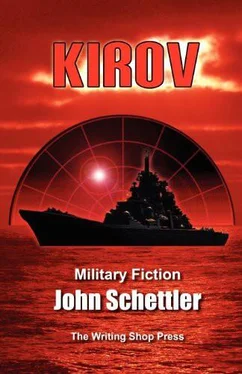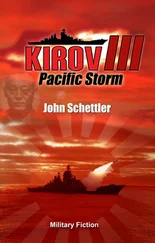John Schettler - Kirov
Здесь есть возможность читать онлайн «John Schettler - Kirov» весь текст электронной книги совершенно бесплатно (целиком полную версию без сокращений). В некоторых случаях можно слушать аудио, скачать через торрент в формате fb2 и присутствует краткое содержание. Жанр: Фантастика и фэнтези, Альтернативная история, на английском языке. Описание произведения, (предисловие) а так же отзывы посетителей доступны на портале библиотеки ЛибКат.
- Название:Kirov
- Автор:
- Жанр:
- Год:неизвестен
- ISBN:нет данных
- Рейтинг книги:5 / 5. Голосов: 1
-
Избранное:Добавить в избранное
- Отзывы:
-
Ваша оценка:
- 100
- 1
- 2
- 3
- 4
- 5
Kirov: краткое содержание, описание и аннотация
Предлагаем к чтению аннотацию, описание, краткое содержание или предисловие (зависит от того, что написал сам автор книги «Kirov»). Если вы не нашли необходимую информацию о книге — напишите в комментариях, мы постараемся отыскать её.
Kirov — читать онлайн бесплатно полную книгу (весь текст) целиком
Ниже представлен текст книги, разбитый по страницам. Система сохранения места последней прочитанной страницы, позволяет с удобством читать онлайн бесплатно книгу «Kirov», без необходимости каждый раз заново искать на чём Вы остановились. Поставьте закладку, и сможете в любой момент перейти на страницу, на которой закончили чтение.
Интервал:
Закладка:
“There will be consequences, Captain. Severe consequences.” Punching a man in the face was one thing. Orlov did that a lot. But killing a man was quite another thing, and in spite of his checkered past, Orlov had never been a murderer. He had hurt men, sometimes badly, but never killed.
“Do you agree?” The Captain's voice was harder now, more insistent. Orlov was his strongest ally and he wanted the comfort of a second command level officer to justify what he knew he would order, one way or another.
“We do not have to fight here,” Orlov suggested again with a nervous edge to his voice. “We could turn north and outrun any battleship they have. The Atlantic is a big ocean.”
Karpov was angry now. “Look, this will go on and on, Orlov. If not here we will face the same question again another time, in another battle, and each time we engage the enemy our missile inventory grows thinner and thinner. We must strike a decisive blow! We must convince them the power we possess is unassailable. We could take out a significant portion of their fleet here with a single warhead now, and all the less to bother us later. I will ask you one final time. Do you support my decision?”
Rodenko had been listening to everything the two men were saying, his eyes casting furtive glances at them as they spoke in hushed tones, their voices tense and strained. Karpov looked at his Chief one last time and said, “are you going to let them chase us off, Orlov, humiliate us as they will do for the next seventy years if we let them?”
Orlov shrugged, his eyes laden with anxiety. “Execute your attack, Captain. I’ll back you. But you had better be quick about it.” He looked at Rodenko, realizing the radar man had heard just a little too much in the heat of their discussion. “Keep your nose here, Rodenko.” he tapped the radar screen, as he opened his jacket, allowing a glimpse of the Glock pistol tucked away there.
Some fifty nautical miles to the south, the fast destroyers of Desron 7 under Captain J.L. Kauffman were racing north. The squadron was composed of eight destroyers some old, some new, just joining the fleet from shipyards all over the northeast from Maine to Massachusetts. Kauffman was aboard DD 431, the USS Plunkett and leading in division 13 with Benson, Mayo and Gleaves. Division 14 was on his right with DDs Madison, Lansdale, Jones and Hughes. Six of the small ships were the older Benson class, a little over 1600 tons. The last two were Gleaves class, much the same in design, yet fresh off the dock yards. An evolution of the older Sims class destroyers, the ships were two stackers with a unique new feature that separated the boiler from the engine room so that the ship could not be disabled by a single hit. It was a fast, durable design, capable of a whisker over 37 knots in trials, though top wartime speed would usually be in the range of 33 to 35 knots. And the ships had a range of nearly 6000 nautical miles on one load of fuel, which made them ideal for deployment to the Atlantic.
Now they were racing north through the choppy seas like a pack of hunting dogs sent to flush out prey. Little did they know that the dark panther they were stalking had teeth and claws to defend herself better than any ship in the world. Kirov was three times the size of these ships, though each destroyer carried nearly as many deck guns as the big Russian battlecruiser, with five 5 inch guns each. But their real teeth were the ten sleek 21 inch torpedoes on two quintuple racks amidships. The destroyer’s job was to rush in, fire their torpedo spread, then make smoke and withdraw, a determined harassment that could be deadly to any ship hit by one of their underwater lances.
Kauffman was eager to get into the fray that day. Everyone aboard was equally ready to avenge the loss of Wasp and deliver a sting to the enemy on the carrier’s behalf. The watchmen were out on the bridge, eyes straining through field glasses as the ships surged forward. Every man was at action stations hoping to be the first to fire at the Germans. They would get their wish soon enough.
As the evening progressed Desron 7 was running at high speed, closing on a distant grey horizon. They had seen strange contrails light up the sky there, and Kauffman followed them back to a single point on the horizon and steered his ships accordingly. Word was that the Germans had some slick new rocket weapon, and they had been lashing the Royal Navy pretty hard with it the last few days. Then came the attack on Wasp, and the Americans got a firsthand look at what these new weapons could do. Kauffman realized the danger ahead for them now. Destroyer Walke had taken a single hit from one of these rockets and was nearly blown in two, sinking in short order.
He saw six, then eight contrails streaking across the sky, as if some enraged monster had clawed the serried clouds with fitful anger. His hounds were racing on, hot with the scent of the enemy now, the first sign they had of the Germans at sea since one of his group had lobbed a depth charge at a Nazi U-boat some months ago, the very first action against hostile forces in the Atlantic by a U.S. Navy vessel. The Germans seemed to be firing at something, but the contrails were not approaching his ships. Perhaps he could sneak up on them before his task force was even noticed, he thought.
Piecing together sighting reports from PBYs out of Argentia, he reasoned that his ships were well inside a hundred miles south of where he suspected the enemy raider was cruising. Now they hurried to put on all possible speed, surging forward in the swelling seas, intent on battle. Their engines strained and their stacks belched out thick smoke as they surged ahead, making nearly 35 knots. With Kirov cruising at nearly top speed, the two groups were now approaching one another at over 75 miles per hour.
Desron 7 was closing in. While Karpov had engaged the British fleet, Kauffman’s destroyers ate up the distance as they pounded their way north, the bows of the small tin cans rising and falling, foredecks awash in the churning seas. Some thirty minutes elapsed while Karpov assessed damage to the British Home fleet and engaged in a discussion with Orlov over how to proceed. In that long interval the destroyers had come within 15 miles of the enemy, though they did not know it yet.
Five minutes later a watchman on DD-421, the Benson, spotted something darkening the distant horizon. He stared, wiping his field glasses clean again, and looking a long time. A shadow grew and thickened, resolving at last to the tall silhouette of a large fighting ship. There it was! He called down to the bridge with the news- enemy ship sighted, dead ahead!
Soon the signal lanterns were winking from ship to ship and battle ensigns rose on the halyards, the flags snapping in the stiff headwinds to signal line abreast for attack. Desron 7 had finally found the Germans, or so they believed. The eight ships spread out in a broad line, racing forward as the anxious crews manned their battle stations. What was out there that had given the Royal Navy such a problem? Any man that managed to crane his neck and squint out a look at the distant enemy ship had but one thought in his mind when he first saw Kirov — the devil to pay…
On they came, the crews tense at the swivel racks where five sleek 21 inch torpedoes were mounted on either side of the ships. Aboard Plunkett, Captain Kauffman knew he was taking a grave risk charging in broad daylight like this given all the scuttlebutt on this new German raider, but he wasn’t about to pass up this opportunity to even the score for Wasp. The Admirals had chewed the fat for some time over this, and turned his boys loose. Now he was going to attack and do his damndest to put a torpedo into the enemy, even if it cost him his ship.
Deep in the heart of the destroyer sat the old electro-mechanical Mark I fire control ‘computer,’ which was a bit of a misnomer given the modern day understanding of that word. Developed in the early 1930’s by the Ford Instrument Company, it was really something more like a massive finely tuned Swiss watch, a bulky, six foot long metal sided box, all of three feet wide and four feet tall. Inside it was a tightly packed menagerie of precision tooled components: gears, rods, balls and bearings, metal plates, drive shafts, couplings and differentials so tightly packed that you could barely insert a finger into the device, and no one who ever looked inside one could believe it was capable of achieving any unified purpose.
Читать дальшеИнтервал:
Закладка:
Похожие книги на «Kirov»
Представляем Вашему вниманию похожие книги на «Kirov» списком для выбора. Мы отобрали схожую по названию и смыслу литературу в надежде предоставить читателям больше вариантов отыскать новые, интересные, ещё непрочитанные произведения.
Обсуждение, отзывы о книге «Kirov» и просто собственные мнения читателей. Оставьте ваши комментарии, напишите, что Вы думаете о произведении, его смысле или главных героях. Укажите что конкретно понравилось, а что нет, и почему Вы так считаете.












